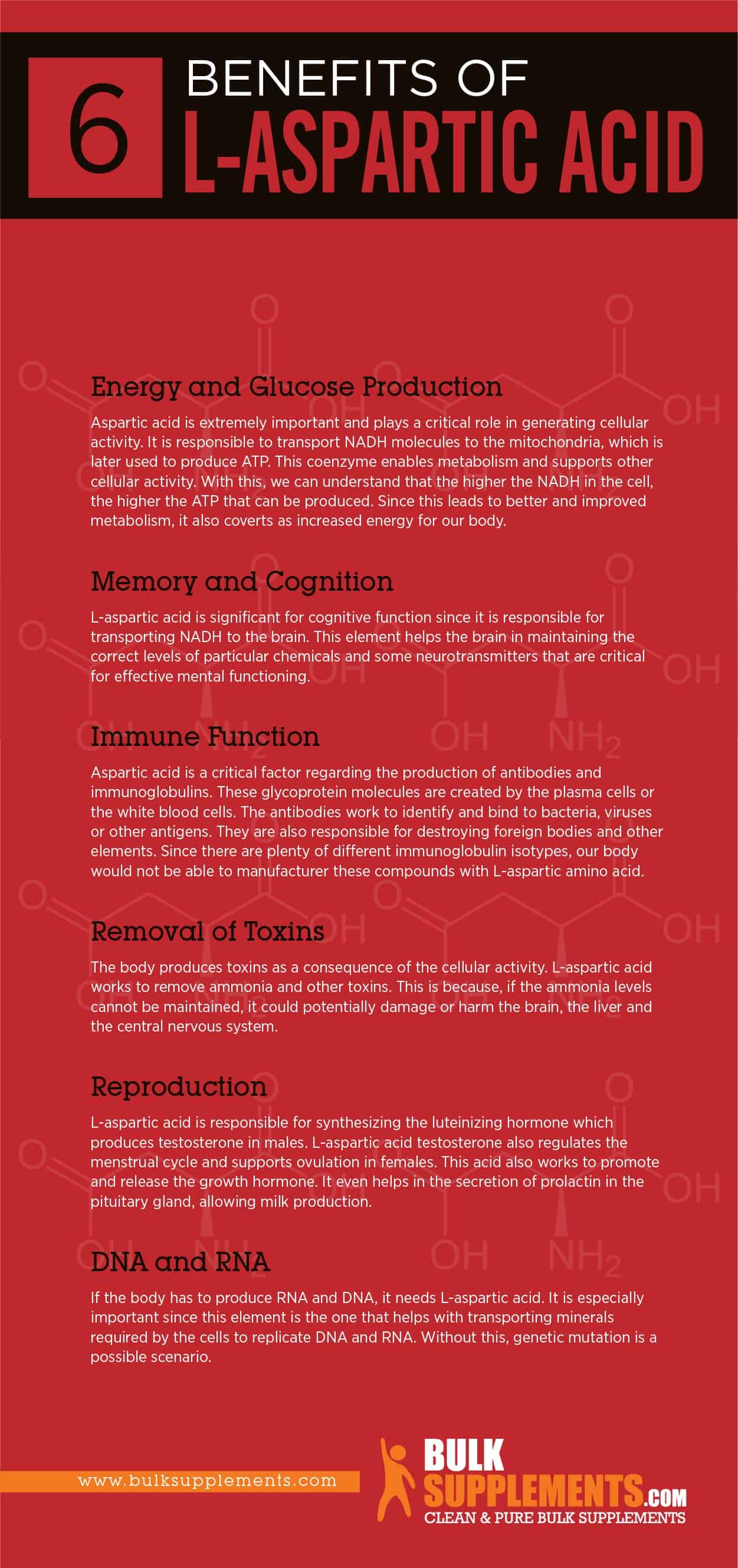What is L-Aspartic Acid?
Aspartic acid, otherwise known as L-aspartate, is basically a non-essential amino acid. It is mainly used to help improve metabolism. There are two forms of aspartic acid — L-aspartic acid and D-aspartic acid. L-aspartic acid vs. D-aspartic acid is a common topic. While the latter has a limited biological function, the former is directly merged into the proteins. L-aspartic acid is found in a variety of sources, such as fish, chicken, peanuts and lentils (x).
Regarding its benefits, it is usually used to increase the strength of the muscles, improve sports performance and reduce fatigue. Aspartic acid is highly involved in the Krebs cycle or the citric acid cycle. It is within this cycle that other amino acids are created. This includes acids like arginine, lysine, asparagine, methionine and so on. Aspartic acid moves the NADH molecules to the mitochondria, where ATP is produced. The element thus produced controls cellular activity (x, x).
L-Aspartic Acid Benefits
L-aspartic acid offers a variety of benefits, including some of the primary ones mentioned below.
- Energy and glucose production
- Memory and cognition
- Immune function
- Reproduction
- Removal of toxins
Energy and Glucose Production
Aspartic acid is extremely important and plays a critical role in generating cellular activity. It is responsible to transport NADH molecules to the mitochondria, which is later used to produce ATP. This coenzyme enables metabolism and supports other cellular activity. With this, we can understand that the higher the NADH in the cell, the higher the ATP that can be produced. Since this leads to better and improved metabolism, it also coverts as increased energy for our body (x, x).
Memory and Cognition
L-aspartic acid is significant for cognitive function since it is responsible for transporting NADH to the brain. This element helps the brain in maintaining the correct levels of particular chemicals and some neurotransmitters that are critical for effective mental functioning (x).
Immune Function
Aspartic acid is a critical factor regarding the production of antibodies and immunoglobulins. These glycoprotein molecules are created by the plasma cells or the white blood cells. The antibodies work to identify and bind to bacteria, viruses or other antigens. They are also responsible for destroying foreign bodies and other elements. Since there are plenty of different immunoglobulin isotypes, our body would not be able to manufacturer these compounds with L-aspartic amino acid (x).
Removal of Toxins
The body produces toxins as a consequence of cellular activity. L-aspartic acid works to remove ammonia and other toxins. This is because, if the ammonia levels cannot be maintained, it could potentially damage or harm the brain, the liver and the central nervous system (x, x).
Reproduction
L-aspartic acid is responsible for synthesizing the luteinizing hormone which produces hormones in males. L-aspartic acid also regulates the menstrual cycle and supports ovulation in females. This acid also works to promote and release the growth hormone. It even helps in the secretion of prolactin in the pituitary gland, allowing milk production (x, x).
DNA and RNA
If the body has to produce RNA and DNA, it needs L-aspartic acid. It is especially important since this element is the one that helps with transporting minerals required by the cells to replicate DNA and RNA. Without this, genetic mutation is a possible scenario (x, x).
Click here to purchase L-aspartic acid powder now

L-Aspartic Acid Side Effects
As always, a higher intake of any compound will lead to side effects. Similarly, with aspartic acid, consumption of sources containing a higher level of this amino acid could potentially show the following symptoms or side effects. It is also said that higher intake could lead to increased levels of neurotransmitters that can damage the neurons. Other side effects have been discussed in detail below (x).
Adverse Cholesterol Impact
Changes in the levels of aspartic acid could lead to unwelcome changes in cholesterol. Since the liver and the kidneys regulate cholesterol, it is possible that the negative effects of aspartic acid on these organs could be responsible for changes in levels of cholesterol. Since our body’s organs work together seamlessly to offer the best health, when one organ doesn’t work properly, it could impact others as well (x).
Bloating and Discomfort
Higher intake of L-aspartic acid could lead to bloating, stomach problems, vomiting and so on. It could also cause loss of coordination and result in fatigue and tiredness (x, x).
Diarrhea
L-aspartic acid is available in a variety of commonly available foods. The branched-chain amino acid is used by athletes and sportspersons to improve their performance, reduce fatigue and so on. However, overconsumption could lead to diarrhea and other forms of digestion troubles (x).
Elevated Liver Enzymes
Another side effect of consuming L-aspartic acid is the abnormally elevated liver enzymes. Aspartate transaminase and alanine transaminase are liver proteins that are extremely critical for proper liver functioning. Increased levels highlight damage to liver cells or inflammation. In conclusion, it is suggested that taking aspartic acid could affect liver function in a negative manner (x).
Increased Kidney Markers
It is commonly known that kidneys filter waste, regulate blood pressure, and are involved in many other functions. Urea, uric acid and creatinine are renal function markers that help us understand if the kidneys are working properly. Increased markers tell us that L-aspartic acid negatively impacts kidney functions as it puts more stress on the organs (x).
L-Aspartic Acid Uses
Besides the L-aspartic acid benefits mentioned under the section above, L-aspartic acid has other uses as well. It increases muscle mass and strength, improves metabolism and fights against chronic fatigue, making it a solid bodybuilding supplement (x).
Muscles and Strength
L-aspartic acid helps increase male hormone levels, sending more oxygen to the muscles. Thanks to the increase in the muscle protein synthesized, it results in creating more lean mass. Besides this, the red blood cells work to improve blood circulation (x).
Helps with Chronic Fatigue
Aspartic acid plays a vital role in generating cellular energy and helping the body deal with chronic fatigue. With this amino acid supporting increased production of antibodies, the body’s immune system is strengthened (x).
Gluconeogenesis
This refers to the process of creating sugar or glucose in the body when the levels are low. The acid is also known to stimulate the NMDA receptor, a neural receptor that is critical to memory and cognitive functions. This is one thing that only aspartic acid of all amino acids can perform. This is also useful for creating other amino acids and preventing deficiency (x, x).
Stamina and Energy
L-aspartic acid is a non-essential amino acid and is generally known to be distributed in proteins. It plays a critical role in the energy cycle of one’s body. It is important for the brain and neural health and equally important to maintain stamina and prevent fatigue. Apart from this, L-aspartic acid is also involved in the ornithine cycle (x, x).
Metabolization
Similar to most amino acids, our body uses aspartic acid to send energy to the body cells, which is then used to synthesize ATP. If it is not made available to the body via a food source, the body can create it from the oxaloacetate molecule (x).
L-Aspartic Acid Dosage
L-aspartic acid is available in the form of a powder supplement. Athletes and sportspersons often take aspartic acid supplements to improve their physical endurance. Natural tablets are favored due to their high bioavailability (x).
Regarding the dosage, it is generally recommended that one dose of 2,000 mg be consumed up to three times daily. Some take over 2,000 mg per day of L-aspartic acid powder depending on the type of physical activity they normally partake in (x).
Overdose of L-aspartic acid could lead to liver or kidney damage. It could also increase the chances of developing gout. While some people consume servings of up to 6,000 mg per day, it is not advisable to do so without professional direction. Even in the case of consumption, it should be divided throughout the day. Consuming over 6,000 mg of L-aspartic acid supplements in one day could lead to the person experiencing serious side effects (x).
L-Aspartic Acid Deficiency
While L-aspartic acid is available from multiple dietary sources, our body can also manufacture it. Due to this, deficiencies regarding the same are not very common. It is usually seen in those who follow a low-protein diet or those suffering from malnutrition. Some illnesses that require an increased level of aspartic acid could also account for deficiencies, especially if the body is unable to keep up with the demand (x).
Deficiency in aspartic acid could lead to a great decline in physical ability since metabolism also slows down. Commonly seen symptoms of reduced aspartic acid levels include low stamina and chronic fatigue. Consuming supplements will help increase energy levels and deal with removing toxins and excess ammonia (x, x).
It is also prudent to note that low levels of L-aspartic acid and increased levels of ammonia could damage the liver and brain. Symptoms of this include low levels of energy, chronic headaches, poor concentration and intolerance to foods containing high protein (x).
Food sources of L-Aspartic Acid
Since L-aspartic acid is a non-essential amino acid, the human body is capable of producing it. However, in some cases, one might require additional supplements. This could be found either in natural food sources or in supplements. Those with eating disorders are likely to require more aspartic acid to combat the deficiency symptoms, such as depression or tiredness (x).
Vegetable sources: L-aspartic acid in foods include oats, asparagus, sprouting seeds, avocado, sugar cane, almonds, peanuts, flax seeds, chicken, eggs, milk, lentils, fish and soy bean.
Animal sources: Sausage meat, oysters, luncheon meats, wild game.
Dietary supplements or salts like magnesium aspartate also contain this amino acid. Likewise, it is also present in sweeteners.
The Bottom Line
L-aspartic acid is an amino acid that is produced by the human body. It is also available from vegetable and animal sources. It helps fight against chronic fatigue and helps with improving metabolization, removing toxins, increasing male hormones and building muscle mass. However, it is also possible to encounter side effects with overconsumption. Some of the ill effects include diarrhea, bloating, vomiting, negative cholesterol impact and damage to the liver and kidneys.
While it is available in natural foods, one could also choose to take L-aspartic acid supplements. It is recommended to stick to advised dosage in order to not encounter any side effects. Deficiency of L-aspartic amino acid could be rectified by consuming the supplements regularly.


